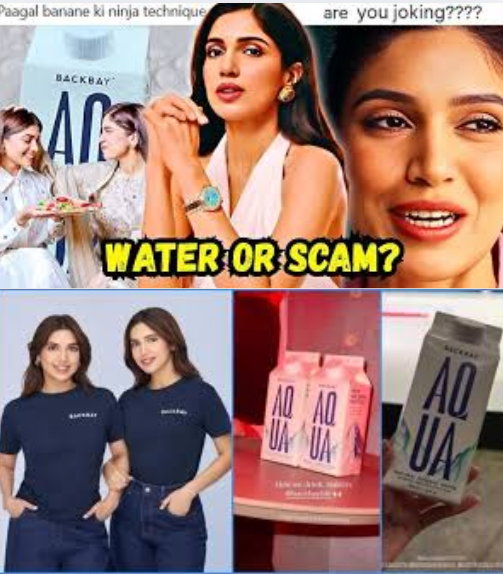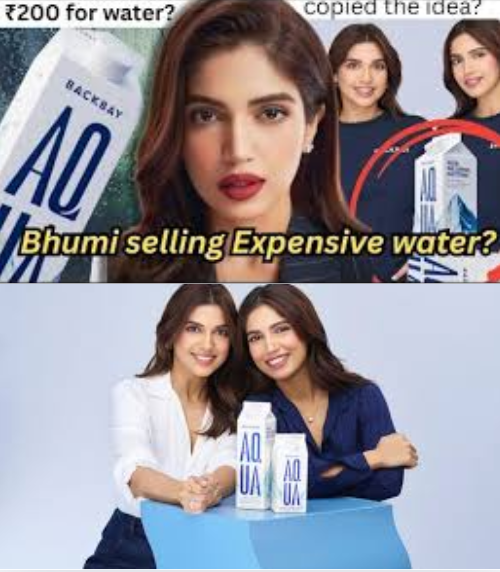Bhumi Pednekar & her sister TROLLED for selling ordinary water as luxury? Bhumi’s new brand a MESS?
In an era where celebrities are increasingly stepping into the world of entrepreneurship, especially within wellness and lifestyle spaces, Bhumi Pednekar’s latest venture has sparked an unexpected controversy. Alongside her twin sister Samiksha Pednekar, Bhumi recently launched a premium bottled water brand called Bagh Eco. Marketed as pure Himalayan mineral water in eco-friendly tetra packaging, the brand positions itself at the intersection of sustainability, health, and style. However, the public reaction has been far from welcoming. Why? Because a 500ml bottle is priced at ₹150, and a 750ml one at ₹200—a price point that raised more eyebrows than applause.
To understand the intensity of backlash, it’s important to look at Bhumi’s public image. She made her Bollywood debut in 2015 with Dum Laga Ke Haisha, a film that challenged mainstream beauty standards and introduced audiences to a relatable, body-positive heroine. Unlike many actresses of her time, Bhumi did not conform to the traditional glam-doll mold. She embraced her natural appearance and chose films that had depth and social relevance, including Toilet: Ek Prem Katha and Shubh Mangal Saavdhan. Over time, she built a reputation as a socially conscious actor who picked substance over superficiality. Her choice of characters and the themes of her films resonated with audiences looking for a break from hyper-glamourized cinema.
However, in recent years, Bhumi’s public image has undergone a transformation. Her style has become more polished, her red carpet appearances more glamorous, and speculation has grown about possible cosmetic enhancements such as fillers and nose procedures. This shift, whether intentional or a natural evolution, has created a disconnect for some fans who once admired her for her authenticity and relatability. In many ways, it feels like Bhumi is repositioning herself—moving away from the “real girl” image that set her apart and aligning more closely with mainstream celebrity culture.
This is where the launch of Bagh Eco feels particularly jarring. The brand’s core message is centered around accessibility, purity, sustainability, and women empowerment. The water is claimed to be sourced directly from the Himalayan springs, untouched by human hands, rich in essential minerals like magnesium and calcium, and packaged in eco-conscious tetra packs. The production is said to be handled entirely by a women-led team based in Himachal Pradesh, aligning with progressive values that consumers today are eager to support. On paper, it sounds ideal.

But reality paints a different picture. ₹200 for a 750ml water bottle in India—a country where the majority of the population still struggles with access to clean drinking water—feels absurdly tone-deaf. For context, popular and widely trusted bottled water brands like Bisleri, Aquafina, and Kinley offer a full liter at around ₹20. These brands dominate the market, not only because of price but because they are accessible, available, and serve a basic need without the frills.
So when a celebrity like Bhumi, who has long positioned herself as a champion for the common person, promotes a ₹200 water bottle as “accessible,” the audience naturally feels betrayed. The term “accessible” itself becomes questionable. Accessible to whom? The urban elite who shop at luxury organic stores in Mumbai and Delhi? Or the average Indian who lives on a budget and values every rupee spent?
Online reactions have been brutally honest. Social media users questioned whether water packaged in tetra packs—a design typically associated with milk cartons—was even a sensible or practical idea. Some called it an unnecessary innovation that solves no real problem. Others highlighted the stark disconnect between Bhumi’s branding and the pricing, calling it a “gimmick” or a “celebrity vanity project.” One viral comment mockingly stated, “₹200 for water? Ninja technique to fool the masses.” Another bluntly described the venture as “stealing from the Himalayas for the urban elite.”
To be fair, the premium bottled water market is not new. Globally, there are brands that charge astonishing amounts for water. Japan’s Fillico Jewelry Water sells 1-liter bottles for over ₹16,000, designed in ornate packaging resembling perfume or liquor. In the US, brands like Acqua Panna and Antipodes sell mineral water for over ₹1,000 per liter. Closer to home, celebrities like Virat Kohli have been seen drinking high-end water brands like Evian or Voss. But the difference is that none of these brands claim to be “for everyone.” They wear their luxury label with pride and don’t attempt to mask exclusivity with vague notions of accessibility.
What Bhumi Pednekar seems to have missed here is the nuance of branding. When a brand chooses to position itself as both premium and accessible, it walks a thin line that requires absolute clarity in communication. Brands like Katrina Kaif’s Kay Beauty have managed to strike this balance well. Kay Beauty products are mid-range in pricing, high in quality, and the brand successfully connects with both aspirational and everyday consumers. Its success lies in understanding the Indian market’s price sensitivity while still delivering on quality and aesthetic value.

Bhumi’s brand, on the other hand, feels like it was built with good intentions but poor execution. While the product may very well be high-quality and genuinely sustainable, the messaging falls flat when juxtaposed with reality. The Indian consumer is smarter than ever. They are informed, vocal, and deeply aware of where they spend their money. Greenwashing, elitism masked as empowerment, or products disguised as necessities won’t go unnoticed anymore.
There’s also the matter of celebrity perception. When a celebrity publicly claims to stand for certain values—such as natural beauty, accessibility, and inclusivity—and then appears to shift toward luxury and exclusivity without transparent reasoning, the audience feels deceived. Bhumi’s transformation, whether cosmetic or stylistic, has made her appear more distant from the persona she originally cultivated. That distance becomes even more glaring when she launches a brand that seems designed for a niche demographic but insists it’s for everyone.
Should a celebrity be held accountable for changing their image or rebranding themselves? Not necessarily. Reinvention is part of personal and professional growth. However, when that reinvention contradicts the core values used to build trust with fans, questions are bound to arise. In Bhumi’s case, the contradiction between her previous “real girl” image and the luxury positioning of Bagh Eco has invited criticism because it feels like a betrayal of what she once stood for.
There is, however, a learning opportunity here—for Bhumi, for other celebrities entering the startup space, and for marketers observing from the sidelines. India’s consumer landscape is diverse, and success doesn’t necessarily come from mimicking Western luxury trends. Instead, it comes from understanding the aspirations, values, and needs of the Indian audience. Pricing a basic necessity like water at ₹200 and marketing it as a socially conscious, inclusive product is a misstep that reveals a fundamental misunderstanding of the market.
That said, the brand is still in its early days. If Bhumi and her team take the feedback seriously and course-correct, there’s still potential for redemption. They could reconsider their pricing model, offer smaller or more affordable units, or be more honest about the product’s exclusivity. Sometimes, the most powerful branding move is transparency. A luxury product doesn’t need to pretend to be accessible if it proudly owns what it is. Similarly, a sustainable brand doesn’t need a celebrity face to be valid—what it needs is authenticity, clarity, and consistency.

In conclusion, Bagh Eco is a classic case study in celebrity branding gone slightly off-course. It’s a reminder that star power can launch a brand, but only authenticity and market empathy can sustain it. Whether Bhumi chooses to listen to her audience and adapt remains to be seen. For now, one thing is clear: in a country where clean drinking water is still a privilege for many, calling a ₹200 bottle “accessible” feels less like a promise—and more like a punchline.
Play video :
News
Why did Hema Malini leave ailing Dharmendra alone at the last moment, his first wife became his support
Why did Hema Malini leave ailing Dharmendra alone at the last moment, his first wife became his support Veteran actor…
Dharmendra is no more, the whole country is in shock, know the truth today! Dharmendra Death Truth Revealed
Dharmendra is no more, the whole country is in shock, know the truth today! Dharmendra Death Truth Revealed The scorching…
Why Bharti Singh’s maid Manisha SUDDENLY DISAPPEARED?| Bharti USED TO FORCE her to shoot VLOGS?
Why Bharti Singh’s maid Manisha SUDDENLY DISAPPEARED?| Bharti USED TO FORCE her to shoot VLOGS? In the world of social…
33 Year Old Famous Beautiful And Gergous Actress Kelley Mack Passed Away
33 Year Old Famous Beautiful And Gergous Actress Kelley Mack Passed Away The world of entertainment has once again…
Meghalaya Murder mystery: Sachin Raghuvanshi’s girlfriend threatens the king’s house, high voltage drama ensues
Meghalaya Murder mystery: Sachin Raghuvanshi’s girlfriend threatens the king’s house, high voltage drama ensues The Raghuwanshi family has recently found…
TV’s ‘Simar’ has changed from head to toe! Divorce…Islam…Cancer… The famous actress has suffered many wounds!
TV’s ‘Simar’ has changed from head to toe! Divorce…Islam…Cancer… The famous actress has suffered many wounds! Deepika Kakar, a well-known…
End of content
No more pages to load












